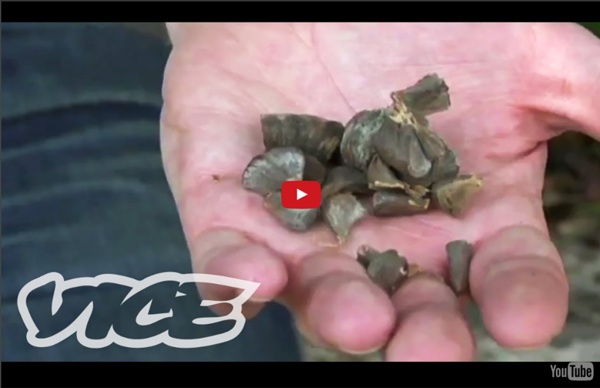



http://www.youtube.com/watch?v=ToQ8PWYnu04
Related: TypesCannabis Effects THC (Delta-9-tetrahydrocannabinol) is the chemical in cannabis that makes you stoned. There can be a huge difference in the amount of THC in the cannabis you buy, sometimes it will be hardly anything, and other times it can go up to 40%. When THC enters your brain it has many effects – it can make you happy, relaxed and giggly. It can also make you feel stressed, paranoid, forgetful and sometimes make you see things that aren’t there. It can also make your heart beat faster and give you red eyes, because it makes your blood vessels open. It can give you a dry mouth and the 'munchies' as well. The Future of DMT Research 8th March 2016 By Luke Sumpter Guest Writer for Wake Up World N-dimethlytryptamine, or DMT, is a psychedelic tryptamine that is structurally similar to serotonin.
Rivea Corymbosa Shamanic Extracts The sacred Aztec hallucinogen " Ololiuhqui " is perhaps the best kept secret for the outside world today, strange enough Ololiuhqui is widely used among the local Indians in Sierra Madre, Oaxacan Mexico. The local Mazatecas use the Rivea corybosa seeds for divination when the Teonanacatl Mushrooms are not available. Rivea corybosa grows easily and abundantly in the mountains of southern Mexico.
Erowid Morning Glory Vault: Basics The seeds of several varieties of Morning Glory (Ipomoea violacea) contain a naturally occurring indole called Lysergic Acid Amide (LSA), which is closely related to LSD. Seeds are taken orally, and can be eaten whole or the active alkaloids can be extracted. The most common active varieties of seeds are Heavenly Blue, Pearly Gates, and Flying Saucers.
Morning Glory (Ipomoea violacea) - Encyclopedia You can order Morning Glory seeds in our online smartshop What is Morning Glory? The seeds of several varieties of Morning glory (Ipomoea violacea) contain a naturally occurring tryptamine called Lysergic Acid Amide (LSA), which is closely related to LSD. Seeds are taken orally, and can be eaten whole or the active alkaloids can be extracted. Like LSD, LSA acts as a "psychedelic" or "hallucinogen" which can have strong mental effects.
Mescaline: a natural Hallucinogen Jordin Hartley Life, Society, and Drugs Gustavo Ibarra November 1st, 2011 Mescaline: A natural Hallucinogen Mescaline is a highly psychoactive chemical naturally occurring in the peyote cactus or Lophophora williamsii, it is also found in other species of cacti including the peruvian torch cactus, and some can be found in certain members of the Fabaceae (bean) family, including Acacia berlandieri. 3,4,5-trimethoxyphenethylamine is the scientific name for mescaline.
San Pedro: One Of Mother Nature’s Most Powerful Psychedelics Alanna Ketler, Collective-EvolutionWaking Times Trichocereus Pachanoi, aka San Pedro, is a columnar cactus native to the Andean mountains of Peru, and Ecuador. Some of the indigenous names for San Pedro are: huachuma, chuma, and wachuma. It is one of the four most sacred plants of Peru, along with Tobacco, Ayahuasca and Coca. San Pedro has hallucinogenic properties and is often compared to the more popular cactus known as Peyote; both are members of the mescaline family. Huachuma – The Visionary Cactus from the Peruvian Andes 17th July 2017 By Sergey Baranov Contributing writer for Wake Up World Huachuma is the original name given to the various mescaline-containing columnar cacti native to the Andes and used traditionally in Peru for millennia for healing and divination.